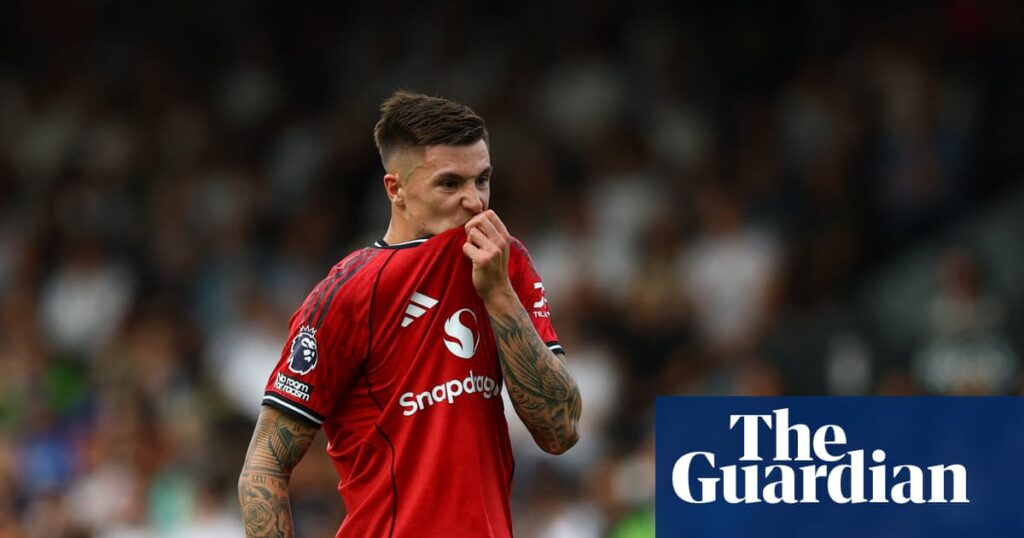As the final whistle was blown at Craven Cottage, Benjamin Sesko wiped his nose on his shirt and then just stood staring down at the turf in the centre circle, while around him the players of Fulham and Manchester United shook hands, embraced, or fell to their knees to praise to the almighty deity, according to preference.
Sesko just carried on staring, then carried on for a bit more, seeming not so much disappointed with this energetically vague 1-1 draw, as consumed by something more basic. How strange to be Sesko right now, aged 22 and a few months, a £73m footballer, thrown into the meat grinder and asked not just to play and score goals for Manchester United, but to fix them too, to work out exactly how this £1bn cut‑and‑shut job of a team, hurled into a non‑negotiable shape by a supremely confident man in white trainers, are actually going to do this.
Score goals. But also invent an attacking rhythm, link the parts, discover how we’re meant to play. Because, frankly, no one else around here seems to have much of a clue.
Craven Cottage had been clammy with late summer heat before kick-off, looking as ever like the kind of place American movies imagine all English football is played, quaint west London terrace houses, chintzy wooden seats, Hugh Grant in a pink shirt. Not to mention a mind-numbingly high‑pitched pre-match public address system, the kind of thing the CIA might have used to smoke out a 1980s Central American dictator from his mansion.
If the football was stodgy at first, there was at least a sense of something new here as half‑time approached with the game still scoreless. For years the talk has been about culture shift around Manchester United. And there was a new dynamic here, the question no longer whether Manchester United will win the Premier League again, but whether Manchester United will ever actually score a goal.
Have they ever scored one? There is a folk memory of United scoring goals. We have photos, grainy films. But is there any hard, unfakeable evidence of this actually happening? Do we need to harass Buzz Aldrin again?
United did score one here, a deflected own goal in the 58th minute, shortly after Sesko had come on. But it wasn’t enough to break a sequence that now states no United player has scored against a team that hasn’t had its goalkeeper sent off since Bilbao in May. That run reads two goals in six games, with four blanks.
This can happen. The real issue here is that United are overseen by a laughably rigid systems manager, who appears to have no actual system for how to attack. What are the patterns, the combinations? Manchester United have spent £200m on an entirely new attacking tripod. Does anyone really know, on the evidence so far, how it is supposed to work? There are options. Overloads, crosses, runs between the lines. Why does this look instead like a football version of some extreme cookery TV programme where you just throw a handful of rice and some walnuts at a baffled looking young man and say: Your mission, Patrick, is to prepare a four-course banquet for 5,000 very unhappy people.”
Amorim talked afterwards about United “creating so many chances” and the absolute certainty they would soon begin to score, and you wondered if perhaps he has already spent too much time crouched staring with a furious focus into the turf at his feet, like the world’s most constipated man poring over the final clue in his cryptic mega-crossword.
On the other hand, the thing about dogma and systems is they can also be decoded. There will be something extra galling for United fans in Marco Silva talking after the game about how his players knew the way to get behind United’s wingbacks because they basically always do the same thing.
The second point is that Sesko is just another one in a long line of very young, very talented footballers thrown into the fray with no clear blueprint, no sense of momentum, nothing but that familiar old sense of dead energy and institutional drag.
Sesko did his best here. He touched the ball 16 times. He didn’t have any shots or dribbles or crosses. There was one lovely little switch of feet. Otherwise he was a ghost at the edge of things, tall, rangy, agile, impressively tattooed, like an AI depiction of Elite Young Euro Footballer 2025.
Elsewhere, Matheus Cunha had his moments. Bruno Fernandes missed a penalty in ludicrous fashion. Fatally distracted by the existence of referee Chris Kavanagh, Fernandes didn’t shank or scuff or balloon his kick into the stands, he belted it gloriously, a perfect connection.
And by the end there was a sense at least of some kind of continuity. Manchester United have spent a decade as a living breathing confirmation that life is what happens while you’re busy making other plans.
This remains an endless cycle of what if, of hope and regret. United were given a pat on the head by many observers for losing 1-0 at home last week. There was talk of “good signs” in the defeat by Arsenal, those good signs the fact most of the United team actually looked like they wanted to play football. Nobody sat down or gave up. This is the starting point now for a rebuild, existentialist ground zero. Is this spectacle better then death? If yes, proceed cautiously to the level of doomed hope.

